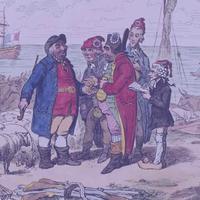Episode 246: Cornish Smugglers [2]
Visitors who don't know the story of Cornwall's smuggling past might think “how
strange - why are they celebrating the King of Prussia here?” but it is, in fact,
the celebration of the unofficial King of Prussia, the smuggler John Carter.
Now, back to our story, smuggling continued pretty
uninterrupted for the majority of the 18th century.
Import taxes remained high, which created the incentive to smuggle.
There were far too few customs officers, far too few government officials in the area to stop
it, which meant there was very little disincentive, there was no great reason to not do it.
And for almost a hundred years, the going was good.
Many smugglers became very wealthy, and the industry, if indeed
we can call it an industry, was vital to the Cornish people.
There's one quote I particularly liked about this that
illustrates the extent of the riches that came from smuggling.
The quote is, and I'm quoting directly:
“When smuggling was in full swing, money became so plentiful that neighbours lent guineas to each
other by the handful, not stopping to count, or being so particular as to reckon by ones and twos'.”
To explain that, a guinea was quite a valuable coin - it's like saying
today that neighbours would lend each other piles of 50 Euro notes
without bothering to count how many notes there were in the pile.
But smuggling was costing the British taxpayer dearly.
It's estimated that up to 25% of the entire British import trade during the
18th century consisted of smuggled goods, goods on which tax had not been paid.
And for certain goods, the percentage was much higher.
Up to 500,000 gallons of brandy, which is 2.3 million litres, were smuggled into Britain every year.
And some estimates have as much as 80% of tea drunk in Britain being smuggled into the country.
But the good times weren't to last forever.
In the late 18th century import taxes were lowered, and the number
of customs officers employed to stop the smugglers increased.
It was a double punch, a double whammy, a pincer movement.
Now there was less of an incentive, less of a reason, to
smuggle, because the taxes weren't nearly as high as before.
And you were much more likely to get caught.
The glory days of the Cornish smuggler were over, and by the mid
19th century the amount of smuggling had drastically reduced.
Smuggling does live on in Cornish legends, though.
You can find it in pub names, like the King of Prussia or even the Bucket of Blood,
a pub named after a landlord who went into his well one morning and pulled out the
head of a customs officer who had presumably been getting too close to the smugglers.
And if you go to Cornwall today, and I would certainly recommend a visit,
you can visit the coastline, you can see the rocks where the ships might
have got stuck, you can see the sandy beaches where the smugglers would have
unloaded their cargo, and visit the caves where it would have been stored.
It might have been illegal, it might have been punishable by death, and it might
have technically been stealing money from the British taxpayer, but it's hard to
deny that there is something quite magical about the legend of the Cornish Smuggler.
OK then, that is it for today's episode on Cornish Smugglers.
I hope it's been an interesting one, that you've learnt something new, and
that you now know a little bit about this curious element of British history.
As always, I would love to know what you thought of this episode.
Have you been to Cornwall?
What do you think about Cornish Smugglers?
Were they real criminals, or simply people doing whatever they could to get by?
And are there interesting stories of smugglers from your country?
I would love to know.
You can head right into our community forum, which is at
community.leonardoenglish.com and get chatting away to other curious minds.
You've been listening to English Learning for Curious Minds, by Leonardo English.
I'm Alastair Budge, you stay safe, and I'll catch you in the next episode.

